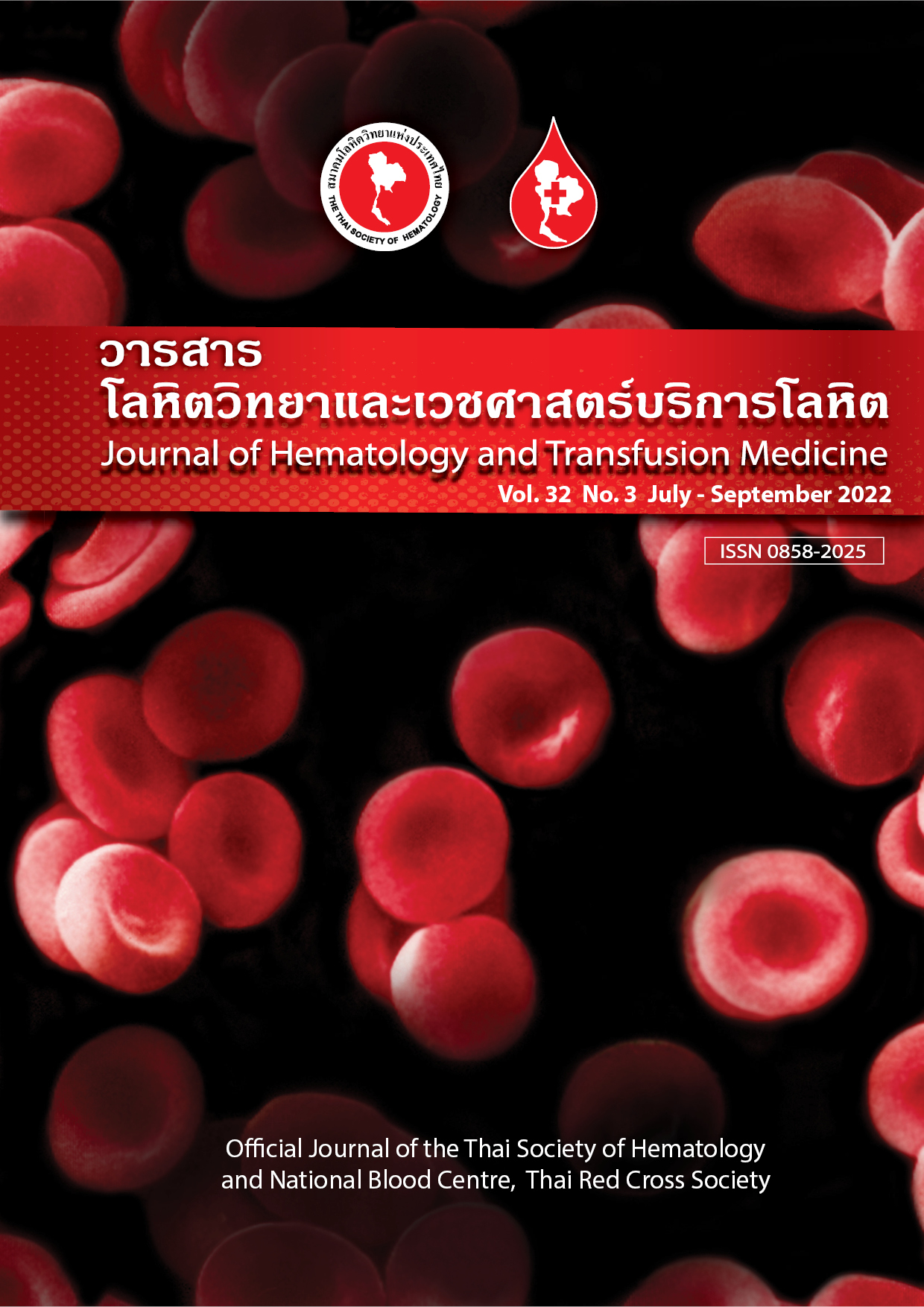Prevalence of platelet reactive antibodies in patient’s refractory to platelet transfusion at Siriraj Hospital
คำสำคัญ:
ภาวะไม่ตอบสนองต่อการให้เกล็ดเลือด, วิธีลิมโฟไซโตท็อกซิกซิตีย์, โซลิดเฟสเร็ดเซลล์แอดเฮียเร็นซ์แอสเซย์บทคัดย่อ
บทนำ ผู้ป่วยที่ได้รับเลือดหรือเกล็ดเลือดเป็นประจำ มีโอกาสเกิดภาวะเกล็ดเลือดต่ำที่ไม่ตอบสนองต่อการให้เกล็ดเลือด (platelet transfusion refractoriness; PTR) สาเหตุที่ทำให้เกิดภาวะนี้มีทั้ง non-immune และ immune คือ ผู้ป่วยถูกกระตุ้นให้สร้างแอนติบอดี (alloimmunization) ต่อ class I human leukocyte antigens (HLA) หรือต่อ human platelet antigen (HPA) ห้องปฏิบัติการ HLA ภาควิชาเวชศาสตร์การธนาคารเลือด โรงพยาบาลศิริราช ได้ทำการตรวจคัดกรองและยืนยันภาวะ alloimmunization ในผู้ป่วยที่สงสัย PTR ด้วยวิธี lymphocytotoxicity test (LCT) และวิธี solid phase red cell adherence assay (SPRCA) ว่าปัญหาเกล็ดเลือดต่ำเกิดจากมีแอนติบอดีต่อเกล็ดเลือดหรือที่เรียกว่าภาวะ alloimmune platelet transfusion refractoriness วัตถุประสงค์ เพื่อศึกษาอัตราการตรวจพบแอนติบอดีในผู้ป่วยที่มีภาวะเกล็ดเลือดต่ำที่ไม่ตอบสนองต่อการให้เกล็ดเลือด และนำข้อมูลมาใช้บริหารจัดการการหาเกล็ดเลือดที่เหมาะสมสำหรับผู้ป่วยกลุ่มนี้ต่อไป วัสดุและวิธีการ ศึกษาข้อมูลย้อนหลังจากตัวอย่างเลือดผู้ป่วยที่มีภาวะ platelet transfusion refractoriness ที่ส่งตรวจ ณ ห้องปฏิบัติการ HLA ภาควิชาเวชศาสตร์การธนาคารเลือด โรงพยาบาลศิริราช ตั้งแต่เดือนมกราคม พ.ศ. 2557 ถึงเดือนธันวาคม พ.ศ. 2562 จำนวน 554 ราย ด้วยวิธี LCT จำนวน 298 ราย และวิธี SPRCA จำนวน 256 ราย ผลการศึกษา ในระหว่างปี พ.ศ. 2557-2562 มีการขอเกล็ดเลือดให้ผู้ป่วยในโรงพยาบาลศิริราชทั้งหมด 16,464 ราย ในจำนวนนี้พบผู้ป่วยที่มีภาวะ PTR และขอส่งตรวจหาแอนติบอดีเพื่อยืนยันภาวะ alloimmunization จำนวน 554 ราย คิดเป็น 3.36 % เมื่อนำมาศึกษาอัตราการตรวจพบแอนติบอดีในผู้ป่วยกลุ่มนี้พบว่าการตรวจหาแอนติบอดีด้วยวิธี LCT จำนวน 298 รายให้ผลบวก 134 ราย (44.97 %) และตรวจหาแอนติบอดีด้วยวิธี SPRCA จำนวน 256 ราย ให้ผลบวก 170 ราย (66.41 %) เมื่อดูความสัมพันธ์ของผลการตรวจระหว่างวิธี LCT และวิธี SPRCA พบว่าทั้งสองวิธีให้ผลการทดสอบแตกต่างกันอย่างมีนัยสำคัญทางสถิติ (p < 0.001) รวมถึงให้ผล percent reactive antibody มากกว่า 70 % มีความแตกต่างกันอย่างมีนัยสำคัญทางสถิติเช่นกัน (34.33 % และ 56.47 % ตามลำดับ p < 0.001) นอกจากนี้พบว่า SPRCA มี turnaround time ที่สั้นกว่าวิธี LCT ( 2 และ 5 ชั่วโมง) สรุป การตรวจด้วยวิธี LCT และวิธี SPRCA สามารถใช้ตรวจภาวะ PTR ที่มีสาเหตุจากแอนติบอดีได้ แต่เมื่อเปรียบเทียบระหว่างสองวิธีพบว่าอัตราการตรวจพบรวมถึงระดับความแรงของแอนติบอดีมีความแตกต่างกันอย่างมีนัยสำคัญทางสถิติ โดย SPRCA สามารถตรวจพบได้อัตรามากกว่าและใช้เวลาที่น้อยกว่าวิธี LCT
Abstract:
Introduction: Platelet transfusion refractoriness (PTR) is one of the major problems encountered in patients who frequently received blood and/or platelet transfusions. The PTR can result from both non-immune and immune causations. Alloimmunization to human leukocyte antigen (HLA) class I or human platelet antigen (HPA) is responsible for the later causation. Two techniques were applied to screen and confirm the immunization cause of the PTR in our HLA laboratory: lymphocytoxicity test (LCT) and solid phase red cell adherence assay (SPRCA). Objective: To study and compare frequencies of immunization PTR investigated in the HLA laboratory by LCT and SPRCA techniques. Materials and Methods: Data of 554 patients investigated for PTR in the HLA Laboratory at Siriraj hospital from January 2014 to December 2019 were retrospectively reviewed and analyzed. Of these, 298 and 256 patients were tested with the LCT and SPRCA techniques, respectively. Results: During 6-year period, there were 16,464 requests for PTR investigation. We found the platelet antibody in 554 patients (3.36%). The LCT was performed in 298 patients, and 134 (44.97%) had a positive result; while, SPRCA was performed in 256 patients, and 170 (66.41%) had positive results (p < 0.001). The percent reactive antibody >70% was also statistically different between the two techniques. (34.33 % vs 56.47 %, p < 0.001). Moreover, SPRCA has a shorter turnaround time (2 vs. 5 hours) when compared to the LCT method. Conclusion: LCT and SPRCA techniques successfully identified the patients with immune cause PTR in our laboratory. However, SPRCA showed a more sensitive, shorter turnaround time and was less labor-intensive than the conventional LCT method.
Downloads
เอกสารอ้างอิง
Duke WW. The relation of blood platelets to hemorrhagic disease: description of a method for determining the bleeding time and coagulation time and report of three cases of hemorrhagic disease relieved by transfusion. JAMA. 1910;55:1185-92.
Han T, Stutzman L, Cohen E, Kim U. Effect of platelet transfusion on hemorrhage in patients with acute leukemia. An autopsy study. Cancer. 1966;19:1937-42.
Sesok-Pizzini D, Herman JH. Platelet transfusion therapy. In: Mintz PD, editor. Transfusion therapy: clinical principles and practice. 3rd ed. Bethesda, MD: AABB Press; 2011:397-432.
Nahirniak S, Slichter SJ, Tanael S, Rebulla P, Pavenski K, Vassallo R, et al. Guidance on platelet transfusion for patients with hypoproliferative thrombocytopenia. Transfus Med Rev. 2015;29:3-13.
Kerkhoffs JL, Eikenboom JC, van de Watering LM, van Wordragen‐Vlaswinkel RJ, Wijermans PW, Brand A. The clinical impact of platelet refractoriness: correlation with bleeding and survival. Transfusion. 2008;48:1959-65.
Meehan KR, Matias CO, Rathore SS, Sandler SG, Kallich J, LaBrecque J, et al. Platelet transfusions: utilization and associated costs in a tertiary care hospital. Am J Hematol. 2000;64:251-6.
Delaflor-Weiss E, Mintz PD. The evaluation and management of platelet refractoriness and alloimmunization. Transfus Med Rev. 2000;14:180-96.
Kittivorapart J. Platelet transfusion refractoriness. J Hematol Transfus Med. 2020;30:281-91.
Hod E, Schwartz J. Platelet transfusion refractoriness. Br J Haematol. 2008;142:348-60.
Srisuddee A, Kupatawintu P, Roekchai C, Inorn K, Phiancharoen S, Nathalang O, et al. A study of platelet antibody detection in patients at the National Blood Centre, Thai Red Cross Society. J Hematol Transfus Med. 2016;26:183-9.
Trial to reduce alloimmunization to platelets study group. Leukocyte reduction and ultraviolet B irradiation of platelets to prevent alloimmunization and refractoriness to platelet transfusions. N Engl J Med. 1997;337:1861-9.
Hopkins KA. The basic lymphocyte microcytotoxicity tests: standard and AHG enhancement. In: Hahn AB, Land GA, Strothman RM, editors. ASHI laboratory manual. 4th ed. American Society for Histocompatibility and Immunogenetics; 2000: I.C.1.1-I.C.1.7.
Capture-guide version 200. USA: Norcross, GA: Immucor, Inc.; 2005.
Capture-P® solid phase system for the detection of IgG antibodies to platelets [package insert]. USA: Norcross, GA: Immucor, Inc.; 2017.
Social Science Statistics. [cited on 2 February 2022] Available from: http://www.socscistatistics.com /tests/ztest/default2.aspx.
Kupatawintu P, Jitjak N, Saelee S, O-Charoen R, Nathalang O. The incidence of platelet antibody in thrombocytopenic patients. J Hematol Transfus Med. 2000;10:123-7.
Agarwal N, Chatterjee K, Sen A, Kumar P. Prevalence of platelet reactive antibodies in patient's refractory to platelet transfusions. Asian J Transfus Sci. 2014;8:126-7.
Sareban N, Macher S, Drexler C, Posch U, Lanzer G, Schallmoser K. Platelet antibody analysis by three different tests. J Clin Lab Anal. 2015;29:198-202.
Kao KJ, del Rosario M. Platelet alloimmunization. In: Anderson KC, Ness PM, editors. Scientific basis of transfusion medicine: implications for clinical practice. Philadelphia: WB Saunders; 2000: 409-19.
Bintaprasit W, Kittisares K, Apisawes K, Chaisongkam D, Thanaketpaisarn Y. The availability of LCT-crossmatched platelets for patients with platelet refractoriness. J Hematol Transfus Med. 2017;3:225-31.
Stroncek DF, Vassallo RR. Platelet and granulocyte antigens and antibodies. In: Cohn CS, Delaney M, Johnson ST, Katz LM, editors. Technical manual. 20th ed. Bethesda, MD: American Association of Blood Banks; 2020. p 464.
ดาวน์โหลด
เผยแพร่แล้ว
ฉบับ
ประเภทบทความ
สัญญาอนุญาต
ลิขสิทธิ์ (c) 2022 วารสารโลหิตวิทยาและเวชศาสตร์บริการโลหิต

อนุญาตภายใต้เงื่อนไข Creative Commons Attribution-NonCommercial-NoDerivatives 4.0 International License.



